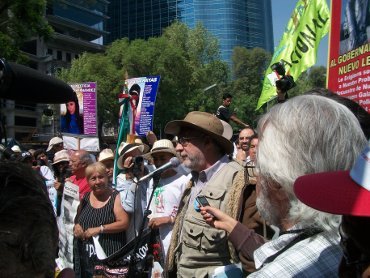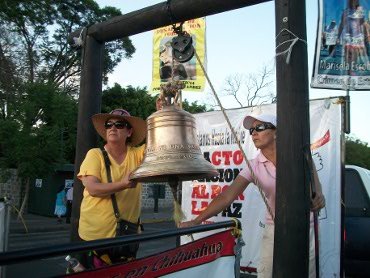


The National Caravan To End Mexico's Drug War Begins
“This Is a Lesson in Democracy. It Is Proof That You Can Live in Solidarity, United,” Says Javier Sicilia
By Erin Rosa
Special to the Narco News Bulletin
June 6, 2011
SATURDAY, JUNE 4, 2011: The Caravan for Peace with Justice and Dignity, part of the nation-wide social movement to end the “war on drugs” in Mexico, has departed on a tour of eleven cities to join other movements in backing a national pact to end the violence that has killed more than 40,000 people.
The caravan (also known as the Caravan of Solace) left on June 4 from Cuernavaca, Morelos, where the movement to end the drug war began after the death of the son of Mexican journalist and poet Javier Sicilia, who was found murdered outside of the city on March 28, along with six other young people. The pact will be signed in Ciudad Juárez, Mexico’s most violent city, on June 10. Participants gathered onto 13 buses at 7 a.m. and began their journey to the caravan’s first stop, which is about an hour away in Mexico City. At the Angel of Independence monument, supporters went on a stage with Sicilia, holding flowers.
 Javier Sicilia speaks to a crowd at the caravan stop in Mexico City. DR 2011 Erin Rosa. |
“The violence is so large,” said Citlaly Alfaro Morelos, a university student from the city of Texcoco in the state of Mexico who came to show support for the caravan. “I think it comes down to jobs. People in society aren’t doing anything. I think the government should do more to create more opportunities for work.” Jessiel López Martínez, another student, said “I’m really interested in the Sicilia caravan. I feel it’s very good that they’re promoting peace throughout the country. I think that means everything.”
Morelia, the capital city of the state of Michoacán, was the stop for the first night of the caravan. The choice by organizers to go to Michoacán is fitting, since it is where the war, which has now led to tens of thousands of casualties and countless disappeared persons, began. It was the first state where the military occupied the streets as a police force against drug traffickers under Mexican President Felipe Calderón’s “war on drugs.” In December 2006, the newly elected president announced Operativo Conjunto Michoacán (Joint Operation Michoacán), a plan which brought 4,000 troops into the state to supposedly disband organized crime.
Since then, hundreds of people have died in drug war violence in the state, and more than two hundred people have gone missing. At 7:30 p.m., the caravan arrived and left their buses to march approximately five blocks to the zócalo, the city’s main square. Leading the march was a pick-up truck with a large bell hanging from its back. Every few seconds, members of the group Ni Una Más Chihuahua would ring the bell, calling out to the people of Michoacán to join and support the caravan to Ciudad Juárez.
When the march was half-way to the zócalo, Maria Lupita Dulcero, who lives in the state, came running up to the front lines of the march asking press and participants, “Is this the caravan from Cuernavaca?” When she was told that it was, she found a megaphone that was being used and shouted to the front of the march, “Welcome! Welcome! We welcome you with opens arms!”
The marchers entered the zócalo with hundreds of supporters waiting for them outside of the baroque Morelia Cathedral. The zócalo, officially named the Plaza de los Martires (Plaza of Martyrs), was transformed into the Plaza de Los Daños Colaterales (Plaza of Collateral Damage), according to signs posted by supporters of the caravan.
 Women with Ni Una Más Chihuahua ring a bell calling for residents of Morelia to joing the caravan. DR 2011 Erin Rosa. |
To a crowd of 1,000 people, indigenous representatives from the Purepecha peoples in Cherán, Michoacán voiced their support for the caravan and told the audience about beatings and deaths from state authorities and organized crime to hinder efforts to stop logging and other development projects on their lands. Organizers with the Committee of Relatives of Disappeared Prisoners in Michoacán talked about the toll the drug war has taken in their home state: “We are here because we know of the state’s irresponsibility over the disappearance of our family members,” said Janahuy Paredes Lachino. “We are demanding that the two hundred disappeared appear here alive in the state of Michoacán, because we are sick of this war against narco-trafficking.”
In a moving testimony, Morelia resident María Hernández de Trujillo talked about how four of her sons had been disappeared in the last three years. Jesús and Raúl went mising in the town of Atoyac, Guerrero in 2008, as did their siblings Gustavo and Luis somewhere on a highway between the states of Puebla and Veracruz last year. “I am the same as Javier Sicilia,” she said, holding back tears. “I am the mother of four disappeared sons…It must be known that my sons are good people, clean people, who were dedicated to working. We’re asking the media to help us, to publicize the cases of my children.”
When Sicilia approached the stage he said, “We are not alone. This is a lesson in democracy, it is proof that you can live in solidarity, united. But we’re not going to build it if the politicians and the criminals continue to fight for privileges. The only thing that we want is to be left to live in peace.” He later quoted Ghandi, saying, “There is no way to peace, peace is the way.”
The first night of the caravan ended where the pain and the violence from Calderón’s drug war took root. It served to amplify the voices of the numerous social movements that have been eye-witnesses to the suffering wrought from the drug war. While, as Sicilia says, not every movement agrees with one another on every political issue, there is a common goal that unites them: the war and the violence must end, and they must end now.
Lea Ud. el Artículo en Español
- The Fund for Authentic Journalism
For more Narco News, click here.




